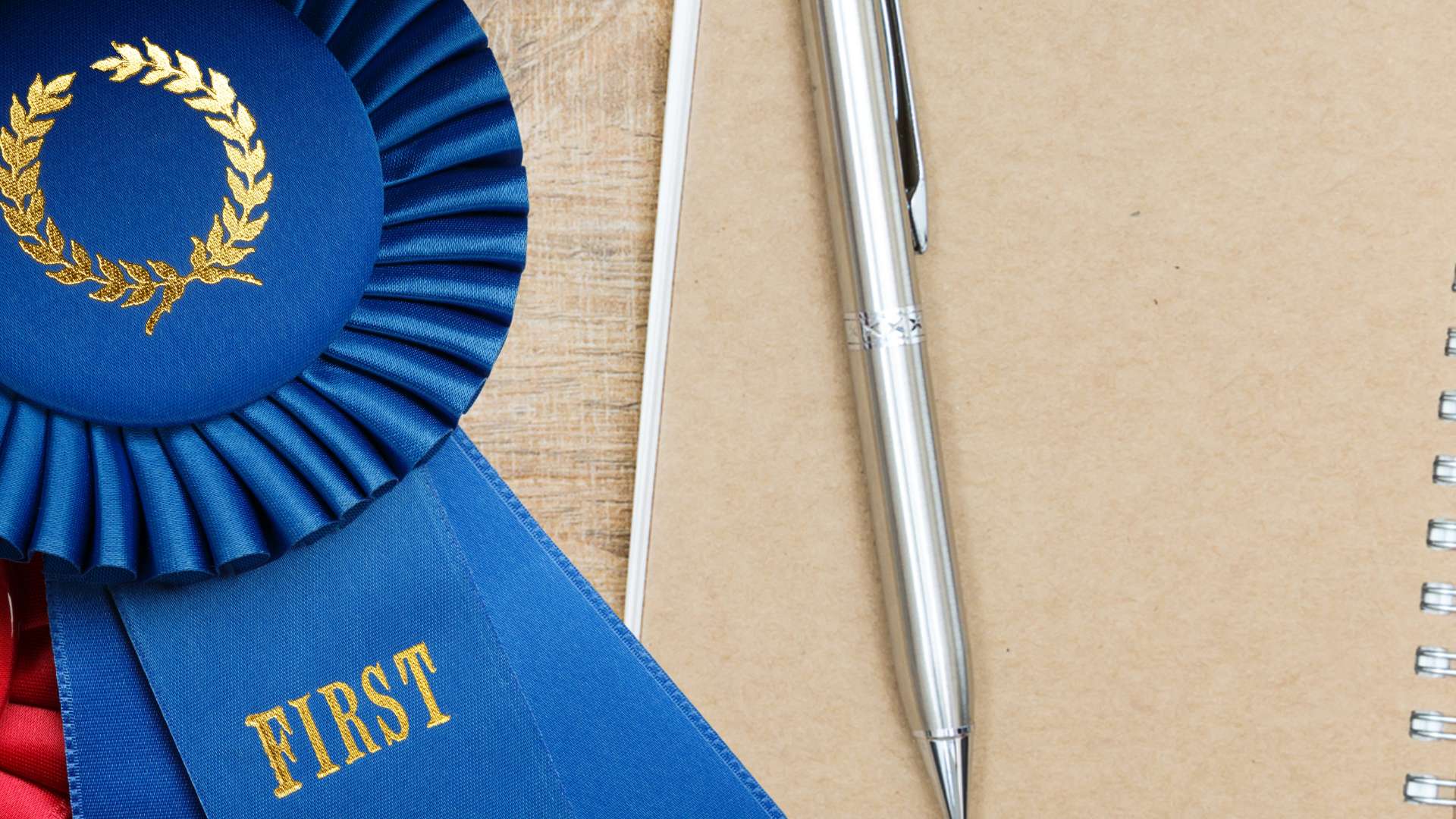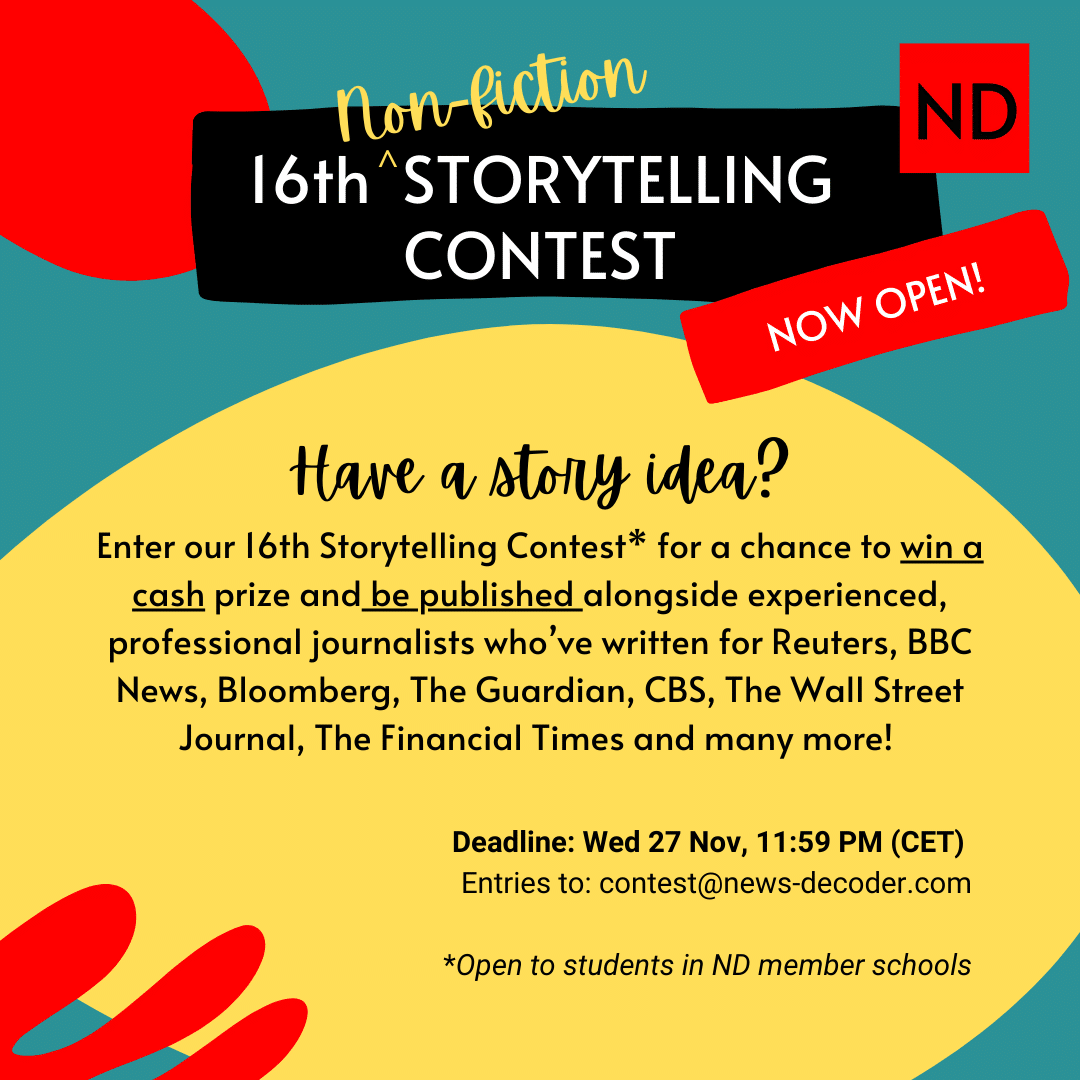Even if you think you won’t win, there is value to entering media competitions. And maybe, you might win.

(Illustration by News Decoder)
In News Decoder’s Top Tips, we share advice for young people from experts in journalism, media literacy and education. In this week’s Top Tip, News Decoder’ Educational News Director Marcy Burstiner explains why young media creators should enter media contests. You can find more of our learning resources here. And learn how you can incorporate our resources and services into your classroom or educational program or by forming a News Decoder Club in your school.
In my last year of high school I wrote an essay that won an award.
My school was supposed to hold a schoolwide essay contest on water conservation. The winning essay would go to a countywide competition.
But the principal forgot to hold the contest and didn’t have an essay to submit. He begged my teacher to come up with a submission and I negotiated two extra points to my final course grade to jam one out that night. You might say it was my first paid assignment.
It ended up winning all-county and I got a calculator and a blue ribbon as a prize at a ceremony that my dad took off from work to attend.
That was a long time ago, but to this day I feel it was my greatest accomplishment, even though my writing has since won other awards, arguably more prestigious.
What other people think
It was a long time between that first award and my second because I wasn’t the type of person to submit my work to contests.
Maybe it was that the fear of losing and feeling less accomplished outweighed the belief that I could win. Or maybe it was the idea that I didn’t need to be recognized as better than anyone else.
I didn’t understand the value of media competitions until I became a teacher and was pushed to enter my students’ works into award contests. The first time I submitted a student’s story to a state contest, she won. The effect on her was startling. Someone who thought of herself as a failure suddenly saw her own potential for success. She hadn’t realized her own talent and intelligence.
If you are a teenager there is a good chance you undervalue your abilities. You might think that if you can do something easily, it isn’t an accomplishment.
I once told a student that a page design he had created was so good he should have signed it. His response was that it only took him half an hour to create. He equated the ease of doing the design to its value. I explained that the value in the art is in how much others appreciate it. And those people — consumers, viewers, users — don’t care how much effort or time you put into it. They look at the result.
Now if you are one of the few people who truly don’t care what other people think, well, good on you. But most of us are affected by other people’s opinions. Competitions give you the opportunity to assess your work through the eyes of others and in doing so get a better appreciation of your own ability. That’s regardless of whether you win or lose.
We undervalue ourselves.
Sabīne Bērziņa is now News Decoder’s user experience manager for its ProMS project, which uses an AI tool to guide students through journalism assignments. But she remembers how she felt when she won the “Journalism Hope” award from the Latvian Journalist’s Union as a young reporter for Diena, a newspaper in Latvia.
“I received it about two years into my career and although I was aware it is not a particularly prestigious award, it felt very motivating to receive some recognition so early on,” Bērziņa said. “I won it together with a friend I used to study with and it was particularly nice because it was for a project we conceptualized on our own and fought against time constraints to produce.”
After that first student of mine won, I became obsessed with entering my students’ works into competitions. Merely suggesting that they enter a story or photo or video into a contest transformed them. It was a recognition by me that they had created something worth submitting.
And when they won — which they often did — that was truly transformational, as it was when I won that countywide competition.
You see, before I won for that essay in high school on why we should conserve water, I didn’t see myself as anything. I was a deeply insecure kid. After that, I was a writer.
That’s why News Decoder holds a twice-yearly storytelling competition for the students in its schools network.
The value of competitions
By encouraging students to submit stories about important experiences in their lives or reported stories on important issues like climate change or immigration or mental health, they get a chance to appraise their work through the eyes of others. In doing so they realize that even if ultimately they aren’t chosen as the best, they deserve to be considered among the best.
Their work, their creation, their voice is worthy of consideration.
If you are a student in our schools network, submissions for our next contest closes 27 November at 11:59 PM CET. Learn more about submitting your non-fiction story here.
But know that there are many competitions out there and many of them are free to enter. You can get a sense of the myriad opportunities by looking at a list compiled by the site Journo Resources. But it isn’t comprehensive and you can likely find contests near you.
If you have never entered a competition, start small. Look for a contest in your school, city, county or province. And if you’ve written about a particular subject, search out contests by that subject, because often advocacy associations sponsor media contests.
Besides boosting your ego — and egos need feeding — winning awards can get you noticed. They help when you look for a job and are nice on a university application.
Plus, they tend to make parents and grandparents really happy. And that’s worth something.
Three questions to consider:
- Why should you enter a media competition when you think you won’t win?
- Why do people often undervalue their achievements?
- What is it you think when you compare your work to the work of others?

Marcy Burstiner is the educational news director for News Decoder. She has been a reporter and editor with at a variety of newsrooms. A graduate of the Columbia Journalism School she is professor emeritus of journalism and mass communication at the California Polytechnic University, Humboldt in California. She is the author of the book Investigative Reporting: From premise to publication.

